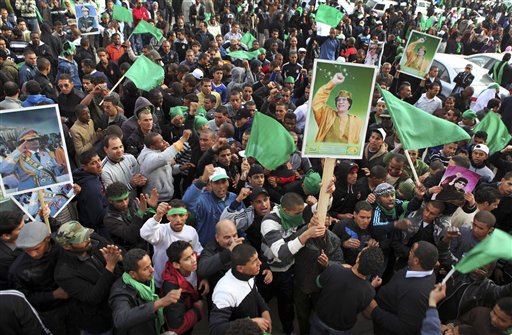Through three days of major protests, Libya stands in stark contrast to neighboring North African countries Egypt and Tunisia. While the regimes in those countries countenanced anti-government protests to varying degrees, Libyan autocrat Moammar Gadhafi has struck down demonstrators with round upon round of violent and bloody repression. We’ve collected a number of links to help you get up-to-date on the conflict.
- Libya has seen 42 years of authoritarian rule under Gadhafi. While the dictator once played the role of nemesis to the United States — even heading up the list of “State Sponsors of Terrorism” — the country is now an oil-rich American ally. (Salon)
- Inspired by recent pro-democracy revolutions in Tunisia and Egypt, Libyan anti-government protests have spread to five major cities so far, and are particularly fierce in the eastern cities of Benghazi and Al-Bayda. (BBC)
- On Thursday, Libyan protesters instigated their own “Day of Rage” against the regime. Prisons have been attacked by the families of inmates, and there have been multiple reports of mass breakouts, and of guards shooting prisoners. (The Telegraph)
- Last night, Reuters reported that anti-government protesters have seized control of the city of Al-Bayda, after they were joined by members of the local police. (Reuters)
- Governmental forces have shot into crowds of peaceful protesters in an effort to disperse them, and even denied medical supplies to hospitals. (BBC)
- Security forces shot into a crowd of mourning protesters leaving a funeral today in the eastern city of Benghazi. At least 15 people were killed and several more injured. (AP)
- Human Rights Watch reports that at least 84 people have been killed by government security forces over the past three days. (HRW)
- The Atlantic’s Andrew Sullivan is collecting updates of the violence in Libya and firsthand accounts of its aftermath on his Daily Dish blog. (The Atlantic)
- While social media sites have played a role in the protests, they are still more controlled in Libya than in neighboring countries. (NPR)
- Despite widespread unrest throughout the nation, the capital city of Tripoli has remained relatively quiet. Gadhafi himself made an appearance in Tripoli’s Green Square yesterday, to help lead a pro-government demonstration in support of himself. (BBC)
- In contrast to Egypt and Tunisia, Libya’s army is divided along tribal lines, and some experts believe that it is unlikely that it will rise in support of the protesters. (BBC)
- These protests are reportedly the most serious challenge Gadhafi has faced during his 42 years in power. A pro-government newspaper warned that the dictator would continue to respond “violently and thunderously” to the uprising. (The Guardian)
- President Obama condemned the recent violent repression of peaceful protests by Middle Eastern regimes, and urged “the governments of Bahrain, Libya and Yemen to show restraint in responding to peaceful protests.” (The Atlantic)

